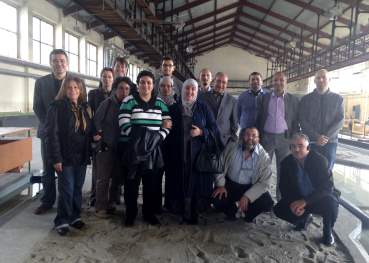Members of the North West Sahara Aquifer System Consultation Mechanism (NWSAS CM), the regional Sahara and Sahel Observatory (OSS) organizations, as well as representatives from the countries sharing the NWSAS – Algeria, Libya and Tunisia - were presented with best practices on bilateral and multilateral cooperation for sustainable Transboundary Water Resources Management (TWRM). The eight participants had the opportunity to have a close look into the benefits and challenges of this cooperation framework. The study visit was organized by GWP-Med, in the framework of the Water, Climate and Development Programme (WACDEP), in collaboration with the Global Environment Facility's IW:LEARN Project (International Waters Learning Exchange & Resource Network) and the NWSAS CM.
The visit to the Secretariat of the ICPDR in Vienna, a transnational body of 14 cooperating states plus the EU, established to ensure the sustainable and equitable use of waters and freshwater resources in the Danube River Basin, included presentations and discussion on the following issues: legal basis of cooperation; the institutional structure of ICPDR and its Secretariat; organizational and technical arrangements to facilitate cooperation among countries; types and levels of cooperation on water and groundwater governance; public participation. A representative of the Environment Agency Austria (Umweltbundesamt) explained key aspects of surface and ground water management in the country and presented main elements of cooperation of Austria with neighboring countries, including in the framework of ICPDR.
The Study Tour also included a visit to the Slovak Water Research Institute (WRI) in Bratislava. Presentations and discussion focused on the WRI main activities and cooperation with the ICPDR, while the new simulation model of the water reservoir Kolarovo at the River Vah was presented during a visit to the Institute’s Hydraulic Laboratories. Finally, the visit to the General Directorate of Water Management of the Hungarian Ministry of Interior, in Budapest, included presentations focusing on water management in Hungary, aspects of cooperation for the management of groundwater at national and bilateral levels, technical issues such as methodologies for the delineation of transboundary groundwater bodies and transboundary geo-scientific models.
Aiming to communicate a diverse range of experiences and models of initiating and organizing cooperation schemes, additionally to the Danube Basin cooperation model, the Drin Basin case and the approach used to initiate cooperation in the basin was presented to the participants, involving the establishment of the Drin Core Group by Albania, FYR Macedonia, Greece, Kosovo and Montenegro; GWP-Med is acting as the Secretariat of the Drin Core Group.
The Study Tour was organized following the approval of the WACDEP planned activities in the NWSAS by the NWSAS Steering Committee on 20-21 November 2013 in Algeria. WACDEP aims to integrate water security in development planning processes and build climate resilience at national and transboundary levels. Specifically for NWSAS, WACDEP aims among other, to support the development of a shared vision for water resources management and the institutional reinforcement of the NWSAS CM. Best practice exchange, experience sharing and capacity building are used as means to facilitate Algeria, Libya and Tunisia in identifying the appropriate means for enhancing cooperation for the NWSAS management, understanding the margin for coordination development, as well as the difficulties that might arise during the process. Given the participants’ interest in the presentations and discussions GWP-Med succeeded in meeting the objective, in a proof of its maturing capacity to assist countries in enhancing cooperation in the field of shared water resources management.
You can find here the Program of the Study Tour.
GWP-Med proves capacity in assisting countries to enhance cooperation in Transboundary Water Resources Management
The interlinkages between the various parts of the GWP-Med work are growing. Programs with a clear TWRM component, such as WACDEP, or focusing entirely on TWRM, as the GEF IW:LEARN, and support to countries and institutions for the management of shared water resources such as the Drin Coordinated Action, and the NWSAS CM, run parallel yet, interlinked paths proving the increasingly sophisticated work, as well as the GWP-Med’s capacity to position itself as a leader in the TWRM field offering distinct comparative advantages in this regard. The spearhead of the GWP-Med interventions in the field of TWRM in South East Europe is the Global Environmental Facility (GEF)/UNDP Project “Enabling Transboundary Cooperation and Integrated Water Resources Management in the Extended Drin River Basin” that will facilitate sustainable management of the Drin Basin water resources on the basis of the Drin Memorandum of Understanding that established the Drin Core Group. Additional engagements pointing out GWP-Med’s deep dive into TWRM has been the close-to-its-end DIKTAS Project (Protection & Sustainable Use of the Dinaric Karst Aquifer System) financed by the GEF, implemented by UNDP and executed by UNESCO, and the preparation of the Stakeholders Analysis and the Public Participation Plan for the International Sava River Basin Commission.
For further GWP-Med activities on Transboundary Water Resources Management, please visit previous relevant articles:
- “Karst Without Boundaries” for sustainable karst groundwater resources management (http://goo.gl/rMed1z)
- Workshop on Legal frameworks for cooperation on transboundary waters,Tunis, June 2014 (http://goo.gl/ZKkiKo)
- Regional Consultation Workshop on Strengthening transboundary water management institutions in North Africa (http://goo.gl/uCXHfn)
For further information on the GEF/UNDP Project “Enabling Transboundary Cooperation and Integrated Water Resources Management in the Extended Drin River Basin”, please visit: http://drincorda.org/gef-project
For more information on the Drin Coordinated Action, the Drin Memorandum of Understanding and the Drin Core Group, please visit: http://drincorda.org/
For further information on the DIKTAS Project, please visit the Project’s website: http://diktas.iwlearn.org/
For more information with regards to WACDEP, please visit: www.gwp.org/wacdep
For more information with regards to GEF IW:LEARN, please visit: http://iwlearn.net/
For more information about the North Western Sahara Aquifer System, please visit: http://www.oss-online.org/en/phase-iii-sass-project-north-western-sahara-aquifer-system
For more information about the International Sava River Basin Commission, please visit: http://www.savacommission.org/.
